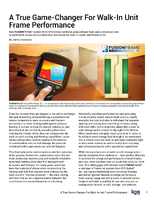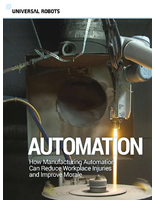Knobs/Handles/Handwheels have antimicrobial compound coating.
Share:
Press Release Summary:
UltraGuard coated products defend against spreading of mold, mildew, and fungi. Antimicrobial compound combines silver with inorganic ceramic that permits continuous, controlled release of ionic silver, which stops growth and kills all bacteria within 3-4 hr. Suited for medical, pharmaceutical, and purification facilities, products are EPA- and FDA-approved for food contact.
Original Press Release:
Monroe Engineering Products (Bloomfield Hills, MI) Is Proud to Introduce Its New Line of 'Ultraguard' Knobs, Handles, And Handwheels Coated with an Antimicrobial Compound
Monroe Engineering Products (Bloomfield Hills, MI) is proud to introduce its new line of 'UltraGuard' knobs, handles, and handwheels coated with an antimicrobial compound. The result is a product that contains another defense against the spreading of bacteria, mold, mildew, and fungi. The coatings main ingredient is silver, the effectiveness of which has been established over the centuries. The antimicrobial compound combines silver with an inorganic ceramic that permits a continuous, controlled release of ionic silver, which effectively stops the growth and kills bacteria over a short period of time.
Monroe offers this new product in a select group of knobs, handles, and handwheels. Each item is stocked in several sizes, all in inch. You can learn more about this product by visiting our website, www.monroeengineering.com or contacting us directly at (248) 540-8585.
Facts and Specifications regarding Monroe's 'UltraGuard" line of Knobs, Handles, and handwheels:
What is the Agion antimicrobial compound?
The Agion antimicrobial compound is a long-lasting, inorganic material that contains silver - a natural agent that has been proven to be successful in controlling the spread and growth of many unwanted organisms, such as bacteria, mold, mildew, and yeast.
Possible applications?
The applications are endless. Natural users of such a product would include industries which must adhere to strict sanitary regulations such as; Medical, Pharmaceutical, Purification facilities, Restaurants, and Food Equipment manufacturers.
How does it work?
A molecule of the antimicrobial compound has three key components: silver ions (the active agent), silver zeolite (acts as a cage that is bound to and releases the silver ions), and the release mechanism, which is the ion exchange.
In the presence of moisture, the silver zeolite acts as an ion pump providing the controlled time release of silver ions into the environment in exchange for sodium ions from the environment. The controlled release provides continuous antimicrobial protection for the product. As humidity increases and the environment becomes ideal for bacteria growth, more silver is released (but, there is an upper limit to the release rate even under very wet conditions).
How quickly does it work?
The process begins immediately and for most types of bacteria, the treated surface will be virtually free of microbial contamination within three to four hours, therefore protecting the product from degrading for the life of the coating. The coating life is a function of the applications and surface wear.
Why is silver effective against bacteria?
Silver ions are effective against a wide range of bacteria, mold and fungi. Silver ions appear to have multiple ways of being effective against bacteria. While the exact mechanisms of action are not fully understood, three possible ways are:
o Silver ions are ingested by the microbe and destroy the cell wall of the microbe.
o Silver interrupts the RNA replication process of the microbe, thereby preventing cell multiplication.
o Through an oxidation process, silver ions cause respiration to be blocked, effectively choking the microbe.
How is the antimicrobial coating attached to the steel?
The silver zeolite powder is blended into an epoxy resin. Through the process of powder coating, the resin is separated into a fine powder and it is electrostatically attracted to the steel. The zeolite is a ceramic material that can withstand temperatures to 1472º F (800º C) and pH values between three and ten while retaining full antimicrobial effectiveness.
Does this mean I never have to clean my equipment?
No. You should view the antimicrobial compound as an additional line of defense in the fight against bacteria, mold, mildew, and yeast. Cleaning the product with a harsh detergent such as bleach will not affect the coating performance, however, it will reduce the life expectancy, which under normal operating conditions is approximately 15 years. Autoclaving will not affect the performance of the coating.
Is the product approved for food contact?
Yes. The Environmental Protection Agency (EPA), Food and Drug Administration (FDA), and the National Sanitation Foundation (NFS) have approved it.
What advantages does Monroe's product have over other competitors?
The coating used by Monroe is an inorganic substance. Unlike an organic antibiotic aimed at a specific aspect of one group of bacteria, inorganic biocides are effective across a broad spectrum of microbes. Another advantage of inorganic antimicrobial coating is that bacteria are less likely to develop resistance to an inorganic biocide. As microbes mutate, they are often able to develop resistance to organic antibiotics. This does not occur with inorganic anti-microbial.




